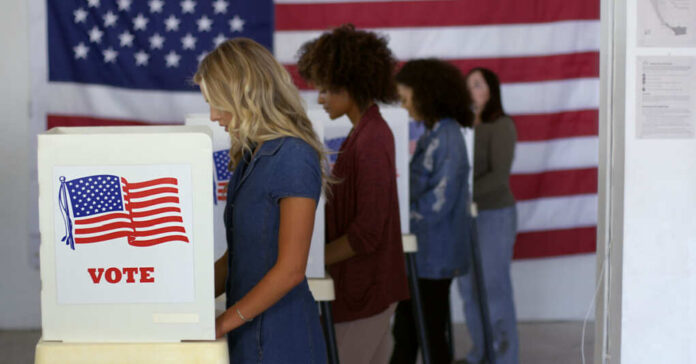The Democrat party is terrified of former President Donald Trump, and it’s widely expected that they will revisit pages from their 2020 playbook to secure another Biden victory. Despite the left’s continued claim that there was no significant voter fraud in 2020, 69% of Republicans and independents believe there was.
Voter fraud doesn’t necessarily mean ballot stuffing and machines that “flip” votes. Some forms, like cross-voting, are more of an ethical concern than outright “fraud.”
Cross-voting occurs when voters participate in the primary elections of a political party other than the one they typically support. They do this to ensure their party faces a weaker opponent.
In states with open primaries, voters can choose which party’s primary they want to participate in, regardless of their party affiliation. This allows voters to cross over and vote for a candidate in the primary of a party other than their usual choice.
In states with closed primaries, only registered members of a specific party can participate in that party’s primary. In these cases, voters need to officially affiliate with a party to have a say in its primary. Some voters may temporarily register with a party they don’t usually support to influence that party’s primary outcome.
And the strategy works. Republican Representative Madison Cawthorn faced a defeat in North Carolina’s 11th congressional district, falling short by fewer than 1,500 votes in September 2022. This outcome followed a campaign led by American Muckrakers that urged Democrats to participate in the Republican primaries. It was later revealed that cross-voting Democrats submitted 14 percent of the 38,000 early Republican ballots cast against Cawthorn.
Some states are working to curb this dishonest practice. In Tennessee, after lawmakers could not pass a measure that would have transitioned the state to a closed primary system, a law mandates polling locations to display signs stating that it is illegal to vote in a party’s primary without being a genuine member or having an affiliation with that political party.
In Wyoming, cross-voting was prohibited after reports surfaced of Democrats registering as Republicans to thwart pro-Trump candidate Harriet Hageman’s candidacy against Liz Cheney. Despite the Democrats’ best efforts, Hageman won the primary with 66.3 percent of the vote.
Elaine Kamarck, a Democratic National Committee member and Harvard lecturer, said it was highly plausible for Democrats participating in the GOP primaries to edge Trump out of a win.
But political engagement expert Mark Shanahan disagrees, pointing out that disrupting an election by influencing the opposing party’s primary sounds good in theory but is tricky to do in reality. He explains that it requires strong organization and coordination, which Democrats lack in some states with open primaries.
Shanahan also mentions the challenge of numbers, observing that in states where Trump has significant support, Democrats cannot make a substantial impact. He further warns Democrats that removing Trump as a candidate might benefit someone like Nikki Haley. Some Democrats are concerned that a Haley win will expose weaknesses in Biden’s campaign and further decrease his chances of winning the White House.
Amal Ahmed, a political science assistant professor at the University of Massachusetts, believes that influencing primary outcomes through strategic voting might not significantly impact election results. Ahmed notes that the practice will fuel election fraud claims and believes the risks of this strategy far outweigh any potential advantages. She further warns that this abuse of open primaries may lead to a shift to closed primaries in both parties.
One Democrat voter in Idaho confessed that she switched her party affiliation to upend the party’s state primaries. She describes her party switch as a form of activism and sees it as a way to influence the selection of candidates who “align more closely with her views.”
An independent voter in Montana, where open primaries are the norm, explained that although he plans to support Democrats in the general election, he intends to participate in the Republican primary.
“I am in a state with relatively few voters, so it can be pretty easy to influence things a bit,” he explained. “It doesn’t take many primary votes in Montana to win or lose. So, if enough people vote for someone who can’t win a general election, it has a lot of impact.”
Although cross-voting is legal in most states, it’s viewed as unethical and another way of cheating. The DNC’s support for this strategy further indicates a lack of confidence in Biden’s ability to win against Trump through a fair election. In the absence of the COVID situation to hide behind, Democrats are eying a different strategy to drag their wildly unpopular choice across the finish line.
But given Trump’s current hold on his party’s nomination, it won’t be enough.



















